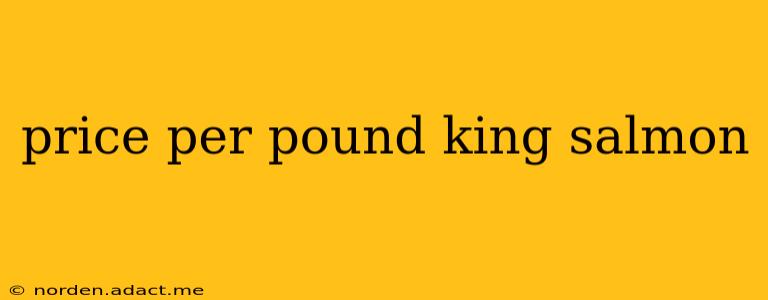The price per pound of king salmon, also known as Chinook salmon, varies significantly depending on several factors. Understanding these factors will help you make informed decisions when purchasing this prized fish. This guide will break down the key influences on price and answer common questions surrounding the cost.
What Factors Influence King Salmon Price?
Several intertwined elements determine the price you'll pay for king salmon:
-
Seasonality: Like many other foods, king salmon prices fluctuate throughout the year. Peak seasons, typically spring and summer, often see higher prices due to increased demand and sometimes limited supply. Conversely, prices might be lower during the off-season.
-
Location: Geographic location plays a substantial role. Prices can vary dramatically depending on whether the salmon is sourced from Alaska, the Pacific Northwest, or other regions. Local markets and transportation costs directly impact final pricing.
-
Fishing Method: The method used to catch the salmon affects the price. Wild-caught king salmon generally command a higher price than farmed salmon due to their superior taste, texture, and nutritional value, and because wild-caught fishing is more labor intensive.
-
Size and Quality: Larger king salmon typically cost more per pound than smaller ones. The quality of the fish—its freshness, appearance, and overall condition—also significantly impacts the price. Top-quality fillets will usually command a premium.
-
Retailer: The type of retailer you buy from influences price. High-end seafood markets often charge more than supermarkets or discount stores. Online retailers might offer competitive pricing but add shipping costs.
-
Demand: Higher demand, perhaps during holiday seasons or special occasions, will often push prices upward.
How Much Does King Salmon Typically Cost?
Providing an exact price per pound is challenging due to the fluctuating factors mentioned above. However, you can expect to pay anywhere from $20 to $40 per pound for high-quality king salmon fillets. Lower-quality cuts or those purchased during less popular times might be slightly cheaper, while premium cuts or sustainably sourced salmon could be more expensive. Remember this is a broad estimate, and prices can vary considerably based on the specific factors listed previously.
Where Can I Find the Best Deals on King Salmon?
Finding the best deals requires some research and planning:
- Check Local Seafood Markets: Smaller, independent seafood markets sometimes offer competitive pricing and fresher fish than large supermarkets.
- Shop During Off-Season: Prices tend to be lower during the off-season (typically fall and winter).
- Look for Sales and Specials: Supermarkets and other retailers often have sales on seafood, so keep an eye out for these.
- Consider Buying Whole: Buying a whole king salmon can sometimes be more cost-effective than buying pre-cut fillets, but requires more preparation.
- Compare Prices Online: Several online retailers sell seafood, allowing for price comparisons. However, always consider shipping costs.
What is the difference in price between Wild Caught and Farmed King Salmon?
Wild-caught king salmon consistently commands a higher price than farmed salmon. This difference stems from the higher cost of wild-caught fishing and the superior quality often associated with wild-caught fish. Wild-caught salmon typically have a richer flavor, a firmer texture, and a higher nutritional profile due to their natural diet and environment.
Is it worth paying more for higher-quality king salmon?
For many, the answer is a resounding yes. Higher-quality king salmon offers a superior taste and texture experience that justifies the premium price for special occasions or when seeking the ultimate culinary experience. The nutritional differences also play a role for health-conscious consumers. However, ultimately the decision of whether or not to pay more depends on individual preferences and budget.
This information should provide a clearer picture of the factors affecting king salmon prices and help you make informed choices when purchasing this delicious fish. Remember to always check local market prices for the most up-to-date information.
